About Ogden, Utah
|
Ogden
|
|
|---|---|
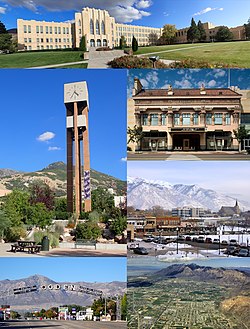
From top left to bottom right: Ogden High School, Weber State University Bell Tower, Peery's Egyptian Theater, Downtown, Gantry Sign, aerial view
|
|
| Nickname:
Junction City
|
|
| Motto:
Still Untamed
|
|
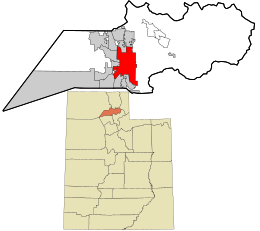
Location in Weber County and the state of Utah
|
|
| Coordinates: 41°13′40″N 111°58′06″W / 41.22778°N 111.96833°W | |
| Country | United States |
| State | Utah |
| County | Weber |
| Settled | 1844 |
| Incorporated | February 6, 1851 (As Brownsville) |
| Named for | Peter Skene Ogden[1] |
| Government
|
|
| • Type | Council-Mayor |
| Area | |
|
• City
|
27.55 sq mi (71.35 km2) |
| • Land | 27.55 sq mi (71.35 km2) |
| • Water | 0.00 sq mi (0.01 km2) |
| Elevation | 4,341 ft (1,323 m) |
| Population
(2020)
|
|
|
• City
|
87,321 |
| • Density | 3,169.55/sq mi (1,223.84/km2) |
| • Urban
|
608,857 (US: 69th) |
| • Urban density | 2,863.9/sq mi (1,105.8/km2) |
| • Metro
|
694,863 (US: 83rd) |
| Demonym | Ogdenite [4] |
| Time zone | UTC−7 (MST) |
| • Summer (DST) | UTC−6 (MDT) |
| ZIP Codes |
84201, 84244, 844xx
|
| Area codes | 385, 801 |
| FIPS code | 49-55980[5] |
| GNIS feature ID | 2411305[3] |
| Website | http://ogdencity.com/ |
Ogden (/ˈɒɡdən/ OG-dən) is a city in and the county seat of Weber County,[6] Utah, United States, approximately 10 miles (16 km) east of the Great Salt Lake and 40 miles (64 km) north of Salt Lake City. The population was 87,321 in 2020, according to the US Census Bureau, making it Utah's eighth largest city.[7] The city served as a major railway hub through much of its history,[8] and still handles a great deal of freight rail traffic which makes it a convenient location for manufacturing and commerce. Ogden is also known for its many historic buildings, proximity to the Wasatch Mountains, and as the location of Weber State University.
Ogden is a principal city of the Ogden–Clearfield, Utah Metropolitan Statistical Area (MSA), which includes all of Weber, Morgan, Davis, and Box Elder counties. The 2010 Census placed the Metro population at 597,159.[9] In 2010, Forbes rated the Ogden-Clearfield MSA as the 6th best place to raise a family.[10] Ogden has had a sister city relationship to Hof in Bavaria, Germany, since 1954.
History
[edit]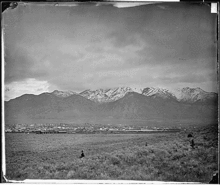
Originally named Fort Buenaventura, Ogden was the first permanent settlement by people of European descent in what is now Utah. It was established by the trapper Miles Goodyear[11] in 1846 about a mile west of where downtown Ogden sits today.
In November 1847, Captain James Brown purchased all the land now comprising Weber County together with some livestock and Fort Buenaventura for $3,000 (equivalent to $98000 in 2023). The land was conveyed to Captain Brown in a Mexican Land Grant, this area being at that time a part of Mexico. The settlement was then called Brownsville, after Captain James Brown, but was later named Ogden for a brigade leader of the Hudson's Bay Company, Peter Skene Ogden, who had trapped in the Weber Valley a generation earlier. There is some confusion about which "Ogden" was the first to set foot in the area. A Samuel Ogden traveled through the western United States on an exploration trip in 1818. The site of the original Fort Buenaventura is now a Weber County park.
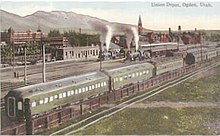
Ogden is the closest sizable city to the Golden Spike location at Promontory Summit, Utah, where the First transcontinental railroad was joined in 1869. It was known as a major passenger railroad junction owing to its location along major east–west and north–south routes, prompting the local chamber of commerce to adopt the motto, "You can't get anywhere without coming to Ogden."[12] Railroad passengers traveling west to San Francisco from the eastern United States typically passed through Ogden (and not through the larger Salt Lake City to the south). However, Amtrak, the national passenger rail system, no longer serves Ogden. Passengers who want to travel to and from Ogden by rail must travel via FrontRunner commuter rail to Salt Lake City and Provo. Renowned Danish impressionistic writer Herman Bang died in Ogden in 1912 during a lecture tour in the United States.[13]
In 1972, The Church of Jesus Christ of Latter-day Saints completed construction of and dedicated the Ogden Utah Temple in Ogden. The temple was built to serve the area's large LDS population. In 2010, the LDS Church announced they would renovate the Ogden Temple and the adjacent Tabernacle. The work which began in 2011 includes an update to the exterior, the removal of the Tabernacle's steeple to make the Temple's steeple a main focus, and a new underground parking garage and gardens.[14] The Temple was rededicated in 2014.[15]
Because Ogden had historically been Utah's second-largest city, it is home to a large number of historic buildings. However, by the 1980s, several Salt Lake City suburbs and Provo had surpassed Ogden in population.
The Defense Depot Ogden Utah operated in Ogden from 1941 to 1997. Some of its 1,128 acres (456 ha) have been converted into a commercial and industrial park called the Business Depot Ogden, colloquially known as "BDO".
Geography
[edit]|
This section needs additional citations for verification. (August 2022)
|
Topography
[edit]Ogden is located at the foot of the Wasatch Mountains. This is at about the same latitude as Benevent in Campania in southern Italy.
According to the United States Census Bureau, the city has an area of 26.6 square miles (69 km2), all land. Elevations in the city range from about 4,300 to 5,000 feet (1,300 to 1,500 m) above sea level.

The Ogden and Weber Rivers, which originate in the mountains to the east, flow through the city and meet at a confluence just west of the city limits. Pineview Dam is in the Ogden River Canyon 7 miles (11 km) east of Ogden. The reservoir behind the dam provides over 110,000 acre⋅ft (140 million m3) of water storage and water recreation for the area.
Prominent mountain peaks near Ogden include Mount Ogden to the east and Ben Lomond to the north.
Streetscape
[edit]
From south to west to north, Ogden's neighboring towns are South Ogden, Roy, West Haven, Marriott-Slaterville, Farr West, Pleasant View and North Ogden. The city is - like many others in the US - characterized by a spacious, street grid with many blocks. The streets are numbered from north to south, which is expressed in the corresponding street names. By extending the numbers with directions ("E" for east and "W" for west) their relative relation to the central point is made clear. In the center of the city, the blocks from Union Station along 25th Street, the north-to-south oriented cross streets are named after former U.S. presidents such as Lincoln Avenue, Grant Avenue, Washington Boulevard, Adams Avenue, Jefferson Avenue, and Madison Avenue. The central connecting street in north–south orientation is Harrison Boulevard. The city area is divided into six districts: in the North End, including West Ogden, Downtown and East Central; in the East, including East Bench and Shadow Valley.
Climate
[edit]According to the Köppen climate classification, Ogden experiences either a Mediterranean climate (Csa) or a humid continental climate (Dsa) depending on which variant of the system is used. Summers are hot and relatively dry, with highs frequently reaching 95 °F (35 °C), with a few days per year reaching 100 °F (38 °C). Rain is provided in the form of infrequent thunderstorms during summer, usually between late July and mid-September during the height of monsoon season. The Pacific storm season usually lasts from about October through May, with precipitation reaching its peak in spring. Snow usually first occurs in late October or early November, with the last occurring sometime in April.
| Climate data for Ogden, Utah, 1991–2020 normals, extremes 1897–present | |||||||||||||
|---|---|---|---|---|---|---|---|---|---|---|---|---|---|
| Month | Jan | Feb | Mar | Apr | May | Jun | Jul | Aug | Sep | Oct | Nov | Dec | Year |
| Record high °F (°C) | 62 (17) |
67 (19) |
79 (26) |
87 (31) |
98 (37) |
106 (41) |
106 (41) |
104 (40) |
104 (40) |
89 (32) |
76 (24) |
65 (18) |
106 (41) |
| Mean maximum °F (°C) | 48.4 (9.1) |
56.6 (13.7) |
69.7 (20.9) |
77.8 (25.4) |
87.6 (30.9) |
96.2 (35.7) |
100.3 (37.9) |
97.4 (36.3) |
91.0 (32.8) |
79.4 (26.3) |
66.0 (18.9) |
53.1 (11.7) |
100.6 (38.1) |
| Mean daily maximum °F (°C) | 35.7 (2.1) |
41.9 (5.5) |
52.7 (11.5) |
59.6 (15.3) |
70.1 (21.2) |
81.5 (27.5) |
91.3 (32.9) |
88.7 (31.5) |
77.8 (25.4) |
62.7 (17.1) |
48.5 (9.2) |
36.8 (2.7) |
62.3 (16.8) |
| Daily mean °F (°C) | 28.5 (−1.9) |
33.4 (0.8) |
42.9 (6.1) |
49.1 (9.5) |
58.6 (14.8) |
68.4 (20.2) |
78.0 (25.6) |
75.8 (24.3) |
65.4 (18.6) |
51.7 (10.9) |
39.5 (4.2) |
29.6 (−1.3) |
51.7 (11.0) |
| Mean daily minimum °F (°C) | 21.2 (−6.0) |
24.9 (−3.9) |
33.1 (0.6) |
38.6 (3.7) |
47.1 (8.4) |
55.3 (12.9) |
64.8 (18.2) |
62.9 (17.2) |
53.0 (11.7) |
40.8 (4.9) |
30.5 (−0.8) |
22.4 (−5.3) |
41.2 (5.1) |
| Mean minimum °F (°C) | 7.1 (−13.8) |
10.9 (−11.7) |
21.1 (−6.1) |
27.2 (−2.7) |
33.8 (1.0) |
42.5 (5.8) |
55.8 (13.2) |
52.3 (11.3) |
39.7 (4.3) |
27.6 (−2.4) |
17.3 (−8.2) |
8.3 (−13.2) |
3.6 (−15.8) |
| Record low °F (°C) | −23 (−31) |
−23 (−31) |
5 (−15) |
6 (−14) |
26 (−3) |
29 (−2) |
36 (2) |
33 (1) |
20 (−7) |
8 (−13) |
0 (−18) |
−20 (−29) |
−23 (−31) |
| Average precipitation inches (mm) | 1.53 (39) |
1.55 (39) |
1.71 (43) |
1.97 (50) |
2.17 (55) |
1.12 (28) |
0.35 (8.9) |
0.72 (18) |
1.06 (27) |
1.68 (43) |
1.17 (30) |
1.33 (34) |
16.36 (414.9) |
| Average snowfall inches (cm) | 13.8 (35) |
11.0 (28) |
5.8 (15) |
2.3 (5.8) |
0.0 (0.0) |
0.0 (0.0) |
0.0 (0.0) |
0.0 (0.0) |
0.0 (0.0) |
0.3 (0.76) |
5.7 (14) |
14.7 (37) |
53.6 (135.56) |
| Average precipitation days (≥ 0.01 in) | 8.8 | 8.6 | 9.1 | 9.9 | 8.9 | 4.8 | 3.0 | 3.9 | 5.5 | 6.7 | 7.3 | 9.4 | 85.9 |
| Source 1: NOAA[16] | |||||||||||||
| Source 2: XMACIS2[17] | |||||||||||||
Demographics
[edit]| Census | Pop. | Note | %± |
|---|---|---|---|
| 1850 | 500 | — | |
| 1860 | 1,464 | 192.8% | |
| 1870 | 3,127 | 113.6% | |
| 1880 | 6,069 | 94.1% | |
| 1890 | 14,889 | 145.3% | |
| 1900 | 16,313 | 9.6% | |
| 1910 | 25,580 | 56.8% | |
| 1920 | 32,804 | 28.2% | |
| 1930 | 40,272 | 22.8% | |
| 1940 | 43,688 | 8.5% | |
| 1950 | 57,112 | 30.7% | |
| 1960 | 70,197 | 22.9% | |
| 1970 | 69,478 | −1.0% | |
| 1980 | 64,407 | −7.3% | |
| 1990 | 63,909 | −0.8% | |
| 2000 | 77,226 | 20.8% | |
| 2010 | 82,825 | 7.3% | |
| 2020 | 87,321 | 5.4% | |
| source:[18][19] | |||
2020 census
[edit]|
This section needs expansion with: examples with reliable citations. You can help by adding to it. (September 2021)
|
| Race / Ethnicity (NH = Non-Hispanic) | Pop 2000[20] | Pop 2010[21] | Pop 2020[22] | % 2000 | % 2010 | % 2020 |
|---|---|---|---|---|---|---|
| White alone (NH) | 54,216 | 52,557 | 52,743 | 70.20% | 63.46% | 60.40% |
| Black or African American alone (NH) | 1,630 | 1,553 | 1,759 | 2.11% | 1.88% | 2.01% |
| Native American or Alaska Native alone (NH) | 681 | 701 | 696 | 0.88% | 0.85% | 0.80% |
| Asian alone (NH) | 1,023 | 966 | 1,197 | 1.32% | 1.17% | 1.37% |
| Pacific Islander alone (NH) | 109 | 241 | 331 | 0.14% | 0.29% | 0.38% |
| Other race alone (NH) | 69 | 150 | 404 | 0.09% | 0.18% | 0.46% |
| Mixed race or Multiracial (NH) | 1,245 | 1,717 | 3,293 | 1.61% | 2.07% | 3.77% |
| Hispanic or Latino (any race) | 18,253 | 24,940 | 26,898 | 23.64% | 30.11% | 30.80% |
| Total | 77,226 | 82,825 | 87,321 | 100.00% | 100.00% | 100.00% |
2010 Census
[edit]As of the census[5] of 2010, there were 82,825 people living in the city. The population density was 2,899.2 people per square mile (1,119.4 people/km2). There were 29,763 housing units at an average density of 1,117.4 units per square mile (431.4 units/km2). The racial makeup of the city was 75.02% White, 2.24% African American, 1.40% Native American, 1.20% Asian, 0.3% Pacific Islander, 3.7% from other races, and 3.7% from two or more races. Hispanic or Latino of any race were 23.64% of the population.
2000 census
[edit]As of the census[5] of 2000, there were 77,226 people, 27,384 households, and 18,402 families living in the city. The population density was 2,899.2 people per square mile (1,119.4 people/km2). There were 29,763 housing units at an average density of 1,117.4 units per square mile (431.4 units/km2). The racial makeup of the city was 79.01% White, 2.31% African American, 1.20% Native American, 1.43% Asian, 0.17% Pacific Islander, 12.95% from other races, and 2.93% from two or more races. Hispanic or Latino residents of any race were 23.64% of the population.
There were 27,384 households, out of which 35.2% had children under the age of 18 living with them, 48.4% were married couples living together, 13.1% had a female householder with no husband present, and 32.8% were non-families. 26.2% of all households were made up of individuals, and 9.6% had someone living alone who was 65 years of age or older. The average household size was 2.73 and the average family size was 3.32.
In the city 28.8% of the population was under the age of 18, 14.6% from 18 to 24, 29.0% from 25 to 44, 16.3% from 45 to 64, and 11.3% who were 65 years of age or older. The median age was 29 years. For every 100 females, there were 102.3 males. For every 100 females age 18 and over, there were 100.5 males.
The median income for a household in the city was $34,047, and the median income for a family was $38,950. Males had a median income of $29,006 versus $22,132 for females. The per capita income for the city was $16,632. About 12.6% of families and 16.5% of the population were below the poverty line, including 20.2% of those under age 18 and 9.3% of those age 65 or over.
2017
[edit]As of 2017 the largest self-identified ancestry groups in Ogden, Utah were
- English (15.3%)
- German (9.8%)
- American (6.7%)
- Irish (6.6%)
- Scottish (3.7%)
- Italian (3.4%)
- Danish (2.9%)
- French (2.1%)
- Swedish (1.9%)
- Welsh (1.7%)[23]
Government and politics
[edit]
Ogden is governed under the mayor-council form of government, in which the full-time mayor serves as an executive while the seven-member part-time council serves as the legislative branch. All these elected officials serve four-year terms, with elections occurring in odd-numbered years and terms beginning in January of even-numbered years.
The mayor is Ben Nadolski, who took office on January 2, 2024.[24] The city council members are Bart Blair, Angela Choberka, Dave Graf, Richard Hyer, Shaun Myers, Ken Richey, and Marcia White. Four of the council members represent the city's four municipal districts,[25] while the other three (Blair, Myers, and White) are elected at-large by voters from the entire city.
The Ogden City government operates on a budget of $267 million per year and employs over 600 full-time workers.[26] In addition to providing the usual municipal services, the government promotes business and economic development. The city operates a redevelopment agency (RDA), with the city council acting as the RDA governing board and the mayor as its executive director. The RDA's activity has increased since its establishment in 1969, with tax increment revenues at about $10 million per year and an outstanding debt of over $50 million. Designated redevelopment districts now cover nearly all of Ogden's central business districts, as are Business Depot Ogden and several other industrial areas in the western parts of the city.
Much of the recent political discourse in Ogden has focused on controversial government-sponsored development projects in the downtown area, including the Ogden Eccles Conference Center, Lindquist Field, The Junction, the Ogden River Project,[27] and other proposals that have not moved forward.[28][29] A proposed streetcar connecting downtown to Weber State University has attracted considerable attention but only limited support.[30] A major controversy flared up in 2005–07 when the mayor and many others pushed unsuccessfully for construction of a luxury residential development on public land in Ogden's foothills and a new ski resort in the mountains above the city, to be accessed by a pair of aerial gondolas.[31] Other local political concerns include Ogden's relatively high tax[32] and utility[33] rates, efforts to fight crime,[34] allegations of government corruption,[35][36] and challenges facing the Ogden City schools.[37][38]
Federal representation
[edit]Ogden is located in Utah's 1st congressional district. In the 118th United States Congress, Ogden is represented by Blake Moore.[39]
Education
[edit]

K-12
[edit]Ogden City School District is the public school district in the city, with its boundaries mirroring the city limits.[40] It operates Ogden High School and Ben Lomond High School.
Weber School District serves areas outside of the city limits,[40] even if they have "Ogden, Utah" postal addresses.
DaVinci Academy of Science and the Arts is an elementary and secondary charter school system.
Utah Schools for the Deaf and the Blind's boarding facility is in the city.
The Roman Catholic Diocese of Salt Lake City operates and/or sponsors Catholic schools including Saint Joseph Catholic High School.
Tertiary level
[edit]Ogden is home to the Ogden Botanical Gardens, which serve as an extension location and distance education center for Utah State University.
Economy
[edit]
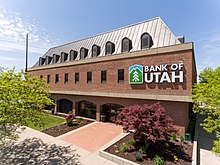
As the principal city of the 2nd largest MSA in Utah, Ogden serves as an economic hub for the northern part of the state. Much of the central city is occupied by offices of federal, state, county, and municipal government entities. The Internal Revenue Service has a large regional facility in Ogden and is the city's largest employer with over 5,000 employees.[41] Other large employers include McKay Dee Hospital, Weber State University, Ogden City School District, Autoliv, Fresenius, and Convergys.[42]
In 2013, Ogden ranked No. 16 on Forbes' list of the Best Places for Business and Careers.[43]
The western parts of the city have several industrial areas. The largest is Business Depot Ogden, a former Army depot that was restructured to be a 1,000-plus acre business park.[44]
Headquarters
[edit]- MarketStar – Sales and marketing company.[41]
- ENVE Composites - high-end bicycle components
- Autoliv North America – Automotive safety equipment.[45]
- Bank of Utah – Banking services.[45]
- America First Credit Union – Banking services.
- Kadince – Software services.
Transportation
[edit]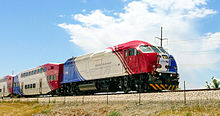
Interstates 15 and 84 serve the city. I-84 runs east–west through the southern suburbs, merging with I-15 near Riverdale. I-15 runs north–south near the city's western edge and provides connections to the rest of the Wasatch Front and beyond. Ogden is served directly by exits 341, 342, 343, and 344. US-89 enters the city from the south, running through the city as Washington Boulevard, which serves as the main street of Ogden. It then continues north to Brigham City. State Route 39 runs east–west through the city as 12th Street, and continues eastward through Ogden Canyon providing access to Pineview Reservoir and the mountain and ski resort town of Huntsville.
The Utah Transit Authority (UTA) operates four bus routes directly between Salt Lake City and Ogden, as well as numerous others that serve Weber and northern Davis counties that connect into either the Ogden Intermodal Hub on the west edge of town or to Weber State University. Ogden is also the source of the two routes that serve Brigham City, the northernmost extension of UTA's bus system. It also has a Greyhound bus stop along a line that runs north–south along I-15. The FrontRunner commuter rail runs between Salt Lake City and the Ogden Intermodal Hub in downtown Ogden.
Amtrak service is provided with a bus connection running to/from Salt Lake City, where there are daily California Zephyr trains west to the Oakland, California, area and east to Chicago, Illinois. Amtrak trains do not serve Ogden directly. Historically, Ogden Union Station served as a hub for frequent trains going northwest to Portland, Oregon, and Seattle, Washington, and east to Chicago. Amtrak ended the Pioneer in 1997. In the same year, Amtrak ended the Los Angeles to Chicago Desert Wind.
Ogden–Hinckley Airport, Utah's busiest municipal airport, is in the southwest portion of the city. The only commercial service is operated by Breeze Airways with nonstop service to Orange County, California. Allegiant Air offered commercial service from Ogden to Phoenix and Mesa, Arizona, Avelo Airlines served Burbank, California, while Utah Airways offers charter service to many of the West's national parks. As of May 2022, both Allegiant and Avelo ceased service, citing rising costs and dropping ticket sales, in addition to expanded availability of air carriers at Salt Lake International airport just 35 minutes south.[46]
Sites of interest
[edit]
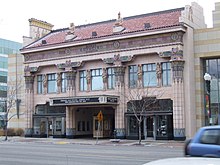

- Bigelow-Ben Lomond Hotel
- Dee Events Center
- Eccles Avenue Historic District
- Historic 25th Street
- The Ice Sheet Curling: venue used during the 2002 Winter Olympics
- Jefferson Avenue Historic District
- The Junction: retail and residential complex
- Ogden High School
- Ogden Nature Center
- Ogden Utah Temple
- American Can Company of Utah Building Complex
- Ott Planetarium
- Peery's Egyptian Theatre
- Snowbasin Ski Area: alpine skiing venue used during the 2002 Winter Olympics
- Union Station
- Ogden Forest Service Building
- Weber State University
Sports and recreation
[edit]The mountains and rivers near Ogden offer many opportunities for outdoor recreation.
An extensive trail system, immediately adjacent to the city's eastern edge, gives residents and visitors immediate access to the foothills of the Wasatch Range. The foothill trails are used for hiking, running, mountain biking, and sometimes snowshoeing and cross-country skiing. Steeper trails climb eastward into the mountains, and many other mountain trails originate within a few miles of the city. A system of paved urban trails runs along the banks of the Ogden and Weber Rivers.[47]
The quartzite cliffs above Ogden's foothills provide a variety of rock climbing routes. An extensive boulder field in the foothills is one of the most popular bouldering sites in the state.

On the mountains east of Ogden are three downhill ski areas: Snowbasin, Powder Mountain, and Nordic Valley. Popular sites for cross-country skiing include Snowbasin and Weber County's North Fork Park.
Kayaking is a popular sport on portions of the Ogden and Weber Rivers. A developed kayak park lies on the Weber River in the western portion of the city. The reservoirs near Ogden are used for a wide variety of water sports.
Ogden is also home to the minor league baseball team Ogden Raptors of the Pioneer League, the Women's Flat Track Derby Association league Junction City Roller Dolls, and the junior hockey team Ogden Mustangs of the United States Premier Hockey League.
Ogden Stadium houses the annual "Hot Rocking 4th", a motorsports event.
There are several golf courses in the city of Ogden.[48]
Weber State University fields several intercollegiate athletic teams that attract spectators from among residents. The university is especially known for its basketball team.
Ogden is a satellite venue of the Sundance Film Festival. A local film festival, now called the Foursite Film Festival, has been held annually since 2004. Other events of interest include a downtown farmer's market, the Ogden Arts Festival, the Harvest Moon Festival, Ogden Winterfest, and the Ogden Marathon.[49]
Ogden has had two shopping malls. Newgate Mall was built in 1981, and Ogden City Mall a year prior. The latter was torn down and redeveloped as The Junction.
Renown
[edit]Two ships in the United States Navy have been named after the City of Ogden; the first, USS Ogden (PF-39), in 1943, and the second, USS Ogden (LPD-5), in 1964.
Ogden was the site of the infamous Hi-Fi murders in 1974.
Flying J, the largest retailer of diesel fuel in North America, once had its corporate headquarters in Ogden.
On September 17, 2024, the National Park Service announced that Ogden was named a World War II Heritage City.[50] [51] [52]
In the media
[edit]Ogden is one of five cities featured in the first season of the ABC reality series Emergency Call, which chronicles real-life 9-1-1 calls and the operator-dispatchers who handle them.[53] The Ogden City Mall (which has since been replaced by The Junction complex) featured in the video of the pop music hit "I Think We're Alone Now" by Tiffany Darwish. New Canaan, a city mentioned in the Fallout: New Vegas DLC Honest Hearts, was based off of Ogden.
Notable people
[edit]- Hal Ashby, Academy Award-winning film director
- Rodney Bagley, co-inventor of the catalytic converter
- Tanoka Beard, basketball player
- Colby Bockwoldt, football player
- Solon Borglum, sculptor
- Fawn M. Brodie, historian
- John Moses Browning, inventor and firearms designer
- Val A. Browning, industrialist, philanthropist, and gun innovator
- Laurence J. Burton, politician, U.S. House of Representatives
- Nolan Bushnell, founder of Atari and Chuck E. Cheese's
- R. D. Call, actor
- Tom Chambers, basketball player
- Les Clark, film animator and director
- Elwood Cooke, tennis player, Wimbledon doubles champion
- Bernard DeVoto, historian
- Kelly Downs, former pitcher for the San Francisco Giants
- Spencer Eccles, philanthropist
- Arthur Guy Empey, adventurer, soldier, writer, actor
- Arnie Ferrin, basketball player
- Byron Foulger, actor
- Tracy Hall, chemist
- William Jefferson Hardin, black legislator
- Robert Harris, first African American to serve in the Utah State Legislature
- William Wadsworth Hodkinson, Paramount Pictures founder
- Francis L. Horspool, painter
- Ashley Jenkins, online personality
- Cecil Jensen, editorial cartoonist
- Edward U. Knowlton, physician and politician
- Damian Lillard, basketball player and NBA Rookie of the Year
- Jeff Lowe, World Class Alpinist
- May Mann, society columnist for The Ogden Standard-Examiner, later Hollywood columnist and celebrity biographer
- J. Willard Marriott, hotel magnate
- Herbert B. Maw, politician, Utah's 8th Governor
- K. Gunn McKay, politician, U.S. House of Representatives
- Joe McQueen, jazz saxophonist
- Wataru Misaka, basketball player
- Blake Moore, politician, U.S. House of Representatives
- Red Nichols, jazz musician, bandleader
- Ray Noorda, business executive
- "The Osmonds": George Jr. (Virl), Tom, Alan, Wayne, Merrill, Jay, Donny, Marie, entertainers
- Janice Kapp Perry, songwriter
- Heath Satow, artist
- Byron Scott, basketball player and coach
- Brent Scowcroft, politician, United States National Security Advisor
- Sarah Sellers, American long-distance runner
- Richard H. Stallings, politician, U.S. House of Representatives
- Ken St. Andre, game designer
- Brent R. Taylor, politician and United States Army officer
- Minerva Teichert, artist
- E. Parry Thomas, banker
- Olene S. Walker, politician, Utah's 15th Governor
- Ginger Wallace, artist and philanthropist
- Gedde Watanabe, actor
See also
[edit]- Amalgamated Sugar Company
- Conoco
- Defense Depot Ogden
- Hi-Fi murders
- International Armoring Corporation
- McKay-Dee Hospital Center
- Standard-Examiner
- Victim: The Other Side of Murder
References
[edit]- ^ Van Atta, Dale (Jan 22, 1977). "You name it - there's a town for it". The Deseret News. pp. W6. Retrieved 18 October 2015.
- ^ "2019 U.S. Gazetteer Files". United States Census Bureau. Retrieved August 7, 2020.
- ^ a b U.S. Geological Survey Geographic Names Information System: Ogden, Utah
- ^ Group forms to promote memory of accomplished but little-known Ogdenite Bernard DeVoto, archived from the original on 2021-04-14, retrieved 2021-04-14
- ^ a b c "U.S. Census website". United States Census Bureau. Retrieved 2008-01-31.
- ^ "Find a County". National Association of Counties. Archived from the original on May 31, 2011. Retrieved 2011-06-07.
- ^ Williams, Carter; Aug. 13, KSL com | Posted-; P.m, 2021 at 6:58. "Census data: Utah's new top 10 most-populated cities — and other emerging places". www.ksl.com. Retrieved 2021-10-06.
cite web: CS1 maint: numeric names: authors list (link) - ^ Maia Armaleo Archived January 22, 2011, at the Wayback Machine "Grand Junction: Where Two Lines Raced to Drive the Last Spike in Transcontinental Track," American Heritage, June/July 2006.
- ^ "Table 1. Annual Estimates of the Population of Metropolitan and Micropolitan Statistical Areas: April 1, 2000 to July 1, 2009 (CBSA-EST2009-01)". 2009 Population Estimates. United States Census Bureau, Population Division. March 19, 2009. Archived from the original (CSV) on June 15, 2010. Retrieved October 26, 2010.
- ^ Levy, Francesca (June 7, 2010). "America's Best Places to Raise a Family". Forbes.
- ^ Roberts, Richard (1994), "Ogden", Utah History Encyclopedia, University of Utah Press, ISBN 9780874804256, archived from the original on March 21, 2024, retrieved March 26, 2024
- ^ "History of Ogden". Ogden City. City of Ogden, Utah. Archived from the original on March 7, 2013. Retrieved February 12, 2013.
- ^ Johnsen, Poul Pilgaard (2021-01-27). "Herman Bangs sidste rejse". www.weekendavisen.dk (in Danish). Retrieved 2023-03-20.
- ^ "Ogden Temple Renovation to Include Significant Architectural Facelift". includes photographs. February 18, 2010. Retrieved February 7, 2011.
- ^ "Ogden Utah Temple News". www.ldschurchtemples.com. Retrieved 2016-01-02.
- ^ "U.S. Climate Normals Quick Access – Station: Ogden Hinkley AP, UT". National Oceanic and Atmospheric Administration. Retrieved July 25, 2024.
- ^ "xmACIS2". National Oceanic and Atmospheric Administration. Retrieved July 25, 2024.
- ^ Moffatt, Riley. Population History of Western U.S. Cities & Towns, 1850–1990. Lanham: Scarecrow, 1996, 308.
- ^ "Subcounty population estimates: Utah 2000–2007" (CSV). United States Census Bureau, Population Division. March 18, 2009. Retrieved May 9, 2009.
- ^ "P004: Hispanic or Latino, and Not Hispanic or Latino by Race – 2000: DEC Summary File 1 – Ogden city, Utah". United States Census Bureau. Retrieved January 26, 2024.
- ^ "P2: Hispanic or Latino, and Not Hispanic or Latino by Race – 2010: DEC Redistricting Data (PL 94-171) – Ogden city, Utah". United States Census Bureau. Retrieved January 26, 2024.
- ^ "P2: Hispanic or Latino, and Not Hispanic or Latino by Race – 2020: DEC Redistricting Data (PL 94-171) – Ogden city, Utah". United States Census Bureau. Retrieved January 26, 2024.
- ^ https://factfinder.census.gov/bkmk/table/1.0/en/ACS/17_5YR/DP02/1600000US4955980[permanent dead link]
- ^ "A Letter From Mayor Nadolski".
- ^ "Archived copy". Archived from the original on 2018-09-28. Retrieved 2019-01-28.
cite web: CS1 maint: archived copy as title (link) - ^ "Mayor's Budget Proposal to Ogden City Council". Ogden City. City of Ogden. Retrieved 5 October 2023.
- ^ McKitrick, Cathy (July 13, 2011). "Ogden gives green light to river development". Salt Lake Tribune. Retrieved October 18, 2011.
- ^ Schwebke, Scott (May 13, 2010). "Ogden's ice tower dreams melted?". Ogden Standard-Examiner. Archived from the original on July 19, 2014. Retrieved October 18, 2011.
- ^ Schwebke, Scott (February 20, 2011). "Godfrey optimistic despite RAMP board's refusal to support field house funds". Ogden Standard-Examiner. Archived from the original on July 19, 2014. Retrieved October 18, 2011.
- ^ Schwebke, Scott (August 24, 2011). "Godfrey wants to halt streetcar proposal". Ogden Standard-Examiner. Archived from the original on October 10, 2013. Retrieved October 18, 2011.
- ^ Schwebke, Scott (July 8, 2007). "Mayor: Course won't be sold for gondola, subdivision". Ogden Standard-Examiner. Archived from the original on July 26, 2012. Retrieved October 18, 2011.
- ^ Davidson, Lee (November 8, 2010). "Where Utah taxes are highest, lowest". Salt Lake Tribune. Retrieved October 18, 2011.
- ^ "Ogden City utility rate schedule". Archived from the original on January 12, 2011. Retrieved October 18, 2011.
- ^ "Will crime center fight crime?". Ogden Standard-Examiner. August 2, 2011. Archived from the original on July 18, 2014. Retrieved October 18, 2011.
- ^ McKitrick, Cathy (November 13, 2010). "Lawmaker, activist decry slow progress of Envision Ogden probe". Salt Lake Tribune. Retrieved October 18, 2011.
- ^ McKitrick, Cathy (May 26, 2011). "Coalition launches to promote ethics in Ogden government". Salt Lake Tribune. Retrieved October 18, 2011.
- ^ Van Valkenburg, Nancy (September 1, 2011). "Mixed bag of results in state board's school progress reports". Ogden Standard-Examiner. Archived from the original on Oct 10, 2013. Retrieved October 18, 2011.
- ^ Van Valkenburg, Nancy (September 12, 2011). "Ogden School District seeks quieter fall". Ogden Standard-Examiner. Archived from the original on Oct 10, 2013. Retrieved October 18, 2011.
- ^ "Representatives". house.gov. Retrieved 2024-04-29.
- ^ a b "2020 Census - school district reference map: Weber County, UT" (PDF). U.S. Census Bureau. Retrieved 2021-06-25.
- ^ a b Graham Lovelady. "Ogden Utah Industries". Ogden-ut.com. Archived from the original on Feb 16, 2012. Retrieved October 14, 2011.
- ^ "Demographics of Ogden City". Ogden City. Archived from the original on October 6, 2011. Retrieved October 14, 2011.
- ^ "Best Places For Business and Careers". Forbes. Archived from the original on Jan 18, 2014. Retrieved 15 January 2014.
- ^ "Business Depot Ogden (BDO) Directional Map". Ogden City. Archived from the original on October 12, 2011. Retrieved October 14, 2011.
- ^ a b "Utah's Largest Employers". Jobbankusa.com. Archived from the original on October 17, 2011. Retrieved October 14, 2011.
- ^ "About". FlyOgden. Archived from the original on January 1, 2016. Retrieved 2016-01-03.
- ^ "Weber Pathways web site". Retrieved October 18, 2011.
- ^ Small, Laird (April 3, 2007). "golflink.com". golflink.com. Retrieved October 14, 2011.
- ^ "GOAL Foundation web site". Retrieved October 18, 2011.
- ^ "National Park Service Announces New American World War II Heritage Cities - Sept 2024 - Office of Communications (U.S. National Park Service)". www.nps.gov. Retrieved 2024-09-18.
- ^ "Ogden designated World War II Heritage City by National Park Service". FOX 13 News Utah (KSTU). 2024-09-17. Retrieved 2024-09-18.
- ^ "MSN". www.msn.com. Retrieved 2024-09-18.
- ^ Thorne, Will (September 3, 2020). "Luke Wilson to Host 'Emergency Call' Unscripted Series, ABC Sets Fall Premiere". Variety.
Further reading
[edit]- (1994) "Hill Air Force Base" article in the Utah History Encyclopedia. The article was written by Charles G. Hibbard and the Encyclopedia was published by the University of Utah Press. ISBN 9780874804256. Archived from the original on February 6, 2023, and retrieved on May 9, 2024.
External links
[edit]- Ogden City web site
 Ogden travel guide from Wikivoyage
Ogden travel guide from Wikivoyage Texts on Wikisource:
Texts on Wikisource:
- "Ogden, Utah". The New Student's Reference Work. 1914.
- "Ogden". Encyclopædia Britannica. Vol. 20 (11th ed.). 1911. p. 22.

